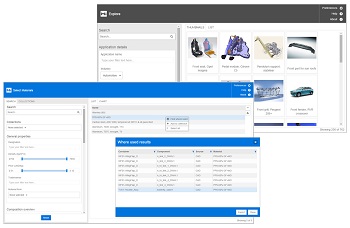New version enables key engineering workflows, enhances simulation support, integrates ‘material intelligence’ across the enterprise

Granta Design today announced GRANTA MI™ Version 9, the latest version of its leading materials information management software, delivering a series of new tools based on extensive experience and feedback from enterprise implementations worldwide.
This major annual release rolls-up all the upgrades and updates from the past year, adds further enhancements, and delivers these new capabilities to all GRANTA MI customers. Version 9 delivers faster material datasheet load-times and major speed-ups in the import of large data sets relative to in Version 8, while new features enable important engineering workflows.
One such set of workflows are those relating to data entry and data requests, which are vital for building a ‘gold source’ of all corporate materials information. Enhancements to the MI:Explore technology, which creates simple, targeted web apps that interact with GRANTA MI, mean that it is now easier to add data in a controlled manner—for example, a technician can enter test data via a simple form; this data is automatically placed, named, and linked to related information.
Such tools can also trigger requests for new tests or information. Similarly, Computer-Aided Design (CAD) users can now request a variant material from their material teams based on an existing specification, identifying properties that are inadequate for their intended application. This enables innovation while ensuring the use of approved data.
Managing and re-using knowledge and experience is also made easier by the new ‘collections’ feature, which helps users to identify and share data sets with common themes. Other new tools enable easy capture of context and application information—e.g., by simple drag-and-drop of images into the database.
Designers selecting a material can also now use an app to connect seamlessly to their corporate Product Lifecycle Management (PLM) system and ask: “Where is this material used?” Accessing knowledge from earlier applications helps to optimize design and avoids repeated product failures or errors.
Enhanced support for generating accurate Computer-Aided Engineering (CAE) input models is provided by the new GRANTA MI:Simulation™ software package. This ensures fully-traceable derivation of these models through new GRANTA MI:Data Analysis Apps™, which support key tasks such as curve smoothing, averaging, and model fitting.
New scripting tools enable these apps to be tailored to the specific needs of a company using common scripting languages such as MATLAB® and Python®. Enhancements to the MI:Materials Gateway™ software provide smooth access to these material models from directly within CAE environments, helping simulation analysts to find and use the right data. Organizations can now guarantee consistency and maximize returns from their investments in simulation.
Version 9 also makes it simple to update and manage restricted substances (substances of concern) information. Users can easily apply updates of reference data from Granta on regulations (such as REACH), substances, materials, coatings, and specifications, merging and linking these with ever-changing in-house data.
A new ‘Substances to Specifications’ report navigates this complex information resource to identify which materials, coatings, or specifications contain particular chemical substances. With this knowledge, enterprises can assess their exposure to risk and compliance obligations and then take appropriate action, such as controlling material and process selection, saving time and cost due to disruptions downstream.
The release also makes it easier than ever to export more types of data, including multiple files and images, to Excel® and other engineering software. It benefits from new tools released earlier this year to manage additive manufacturing data and help with composite qualification. Finally, the comprehensive GRANTA MI library of reference data on metals, composites, plastics, ceramics and natural materials has been updated—including the latest MMPDS-09 aerospace alloy data, new versions of CAMPUS®and Prospector® Plastics, and new MI-21, StahlDat, and SteelSpec data on steels and other metals.
Integrating 'material intelligence' across your enterprise enables you to get the most out of your strategic and valuable corporate materials knowledge. With GRANTA MI Version 9, we have made enhancements based on customer feedback to deliver our most powerful enterprise version yet.
Dan Williams - Product Manager, GRANTA MI